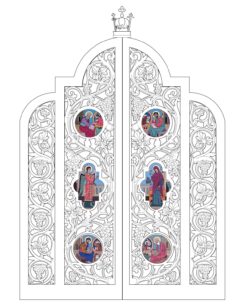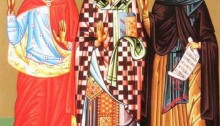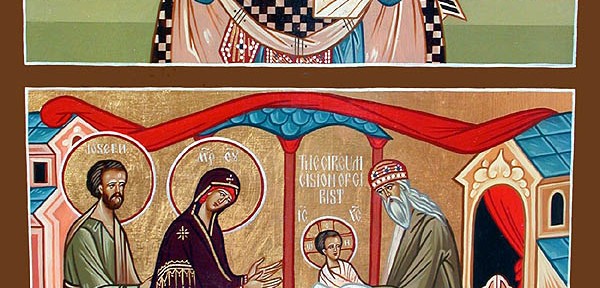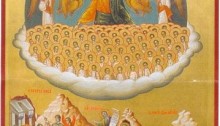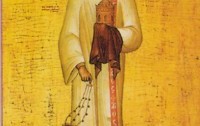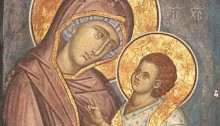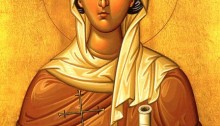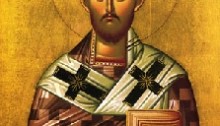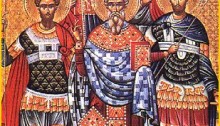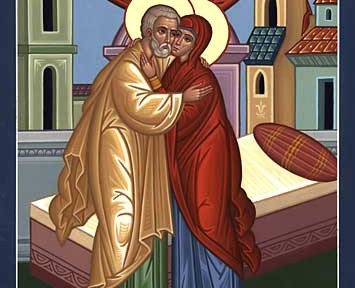When Diocletian began his persecution of the Christians, Theopempos, Bishop of Nicomedia, was among the first to suffer martyrdom for Christ. Theopempos was brought before the emperor who threatened him with punishment of death if he did not deny Christ. To that threat, the courageous bishop responded to the emperor: “It stands written, `Do not be afraid of those who kill the body’ (St. Luke 12:4), `but cannot kill the soul’ (St. Matthew 10:28). O Emperor, you have authority over my body; do with it what pleases you.” Theopempos was severely beaten, suffered from hunger and tortured in various ways. Finally, the emperor summoned a certain magician, Theonas by name, to outwit this godly man through magic. Theonas dissolved the most potent poison in water and gave it to Theopempos to drink. Theopempos traced the sign of the cross over the glass and drank the poison. Theonas, upon seeing that the poison had no effect on Theopempos, turned to the emperor and shouted, ” I, too, am a Christian and bow down before the Crucified One.” Both were sentenced to death in the year 298 A.D.; Theopempos was beheaded and Theonas was buried alive. They honorably suffered and became citizens of the Kingdom of Christ. (Prologue of Ohrid) Continue reading January 5, 2014 Sunday before Theophany, Octoechos Tone 8 Holy Martyrs Theopemptus and Theona Venerable Woman Syncletica
Continue reading January 5, 2014 Sunday before Theophany, Octoechos Tone 8 Holy Martyrs Theopemptus and Theona Venerable Woman Syncletica
Author: Michael Winn
January 1, 2014 The Circumcision of Our Lord, God and Saviour Jesus Christ Our Father Among the Saints Basil the Great, Archbishop of Caesarea in Cappadocia (379) Gregory of Nazianzis, father of Gregory the Theologian (374) Holy Martyr Basil of Ankyra (322)
The eighth day following His birth, the Divine Child was presented in the Temple and circumcised according to the Law existing in Israel since the time of Abraham. On this occasion, He was given the name Jesus, which the Archangel Gabriel announced to the All-Holy Virgin Mary. The Old Testament circumcision was the proto-type of the New Testament baptism. The circumcision of our Lord shows that He received upon Himself the true body of man and not just seemingly, as was later taught of Him by heretics. Our Lord was also circumcised because He wanted to fulfill the entire Law which He Himself gave through the prophets and forefathers. In fulfilling the written Law, He replaced it with Baptism in His Holy Church as was proclaimed by the Apostle Paul: “For neither does circumcision mean anything, nor does uncircumcision, but only a new creation” (Galatians 6:15).
Basil was born during the reign of Emperor Constantine. While still unbaptized, Basil spent fifteen years in Athens where he studied philosophy, rhetoric, astronomy and all other secular sciences of that time. His colleagues at that time were Gregory the Theologian and Julian, later the apostate emperor. In his mature years he was baptized in the river Jordan along with Euvlios his former teacher. He was Bishop of Caesarea in Cappadocia for almost ten years and completed his earthly life fifty years after his birth. He was a great defender of Orthodoxy, a great light of moral purity, a religious zealot, a great theological mind, a great builder and pillar of the Church of God. Basil fully deserved the title “Great.” In liturgical services, he is referred to as the “bee of the Church of Christ which brings honey to the faithful and with its stinger pricks the heretics.” Numerous works of this Father of the Church are preserved; they include theological, apologetical, ascetical and canonical writings as well as the Holy and Divine Liturgy named after him. This Divine Liturgy is celebrated ten times throughout the year: the First of January, his feast day; on the eve of the Nativity of our Lord; on the eve of the Epiphany of our Lord; all Sundays of the Honorable Fast [Lenten Season], except Palm Sunday; on Great and Holy Thursday and on Great and Holy Saturday. St. Basil died peacefully on January 1, 379 A.D., and was translated into the Kingdom of Christ. (Prologue of Ohrid)
December 29, 2013 Sunday after the Nativity of our Lord God and Saviour Jesus Christ Holy and Just Joseph, King David and James, Brother of the Lord in the Flesh Octoechos Tone 7
When the Magi from the east did not return to Jerusalem from Bethlehem to inform Herod about the newborn King but rather, at the angel’s command, returned to their homeland another way, Herod became as enraged as a wild beast and ordered all the children two years old and under in Bethlehem and its surroundings to be killed. This frightening command of the king was carried out to the letter. His soldiers beheaded some of the children with swords, smashed others against stones, trampled others underfoot, and strangled others with their hands. And the cries and wails of the mothers rose to heaven, Lamentation, and bitter weeping; Rachel weeping for her children (Jeremiah 31:15, Matthew 2:18), as had been prophesied. This crime against the multitude of innocent children was carried out a year after the birth of Christ, at the time when Herod was seeking to find the Divine Child. He asked Zacharias about his son John, so that he might kill him, since he naturally thought that John was the new king. As Zacharias did not turn John over, he was slain in the Temple by order of Herod. St. Simeon the God-receiver would also have been murdered soon after the Presentation in the Temple, had he not already reposed in God. After murdering the children of Bethlehem, Herod turned against the Jewish elders who had revealed to him where the Messiah would be born. He then killed Hyrcanes, the high priest, and the seventy elders of the Sanhedrin. Thus, they who had agreed with Herod that the new Child-king must be killed came to an evil end. After that, Herod murdered his brother, sister, wife and three sons. Finally, God’s punishment came to him: he began to tremble, his legs became swollen, the lower part of his body became putrid, and worms came out of the sores; his nose became blocked and an unbearable stench emanated from him. Before his last breath, he remembered that there were many captive Jews in prison, and he ordered that they all be killed so that they would not rejoice in his death. Thus, this terrible ruler gave up his inhuman soul and handed it over to the devil for eternal possession. (Prologue of Ohrid) Continue reading December 29, 2013 Sunday after the Nativity of our Lord God and Saviour Jesus Christ Holy and Just Joseph, King David and James, Brother of the Lord in the Flesh Octoechos Tone 7
Continue reading December 29, 2013 Sunday after the Nativity of our Lord God and Saviour Jesus Christ Holy and Just Joseph, King David and James, Brother of the Lord in the Flesh Octoechos Tone 7
December 27, 2013 Holy Apostle, First Martyr and Archdeacon Stephen
Stephen was a kinsman of the Apostle Paul and one of those Jews who lived in the Hellenic provinces. Stephen was the first of the seven deacons whom the holy apostles ordained and appointed to the service of assisting the poor in Jerusalem. For this, he is called the archdeacon. By the power of his faith, Stephen worked great miracles among the people. The wicked Jews disputed with him, but they were always defeated by his wisdom and the power of the Spirit, Who acted through him. Then the shameful Jews, accustomed to calumnies and slander, incited the people and the elders of the people against the innocent Stephen, slandering him as though he had blasphemed against God and against Moses. False witnesses were quickly found who confirmed this. Stephen then stood before the people, and all saw his face as it had been the face of an angel (Acts 6:15), that is, his face was illumined with the light of grace as was once the face of Moses when he spoke with God. Stephen opened his mouth and enumerated the many good works and miracles that God had performed in the past for the people of Israel, as well as the many crimes and opposition to God on the part of this people. He especially rebuked them for the killing of Christ the Lord, calling them betrayers and murderers (Acts 7:52). And while they gnashed their teeth, Stephen beheld and saw the heavens open and the glory of God. That which he saw, he declared to the Jews: Behold, I see the heavens opened and the Son of Man standing on the right hand of God! (Acts 7:56). Then the malicious men took him outside the city and stoned him to death. Among his persecutors was his kinsman Saul, later the Apostle Paul. At that time, the Most-holy Theotokos, standing on a rock at a distance with St. John the Theologian, witnessed the martyrdom of this first martyr for the truth of her Son and God, and she prayed to God for Stephen. This occurred one year after the descent of the Holy Spirit upon the apostles. Gamaliel, a prince of the Jews and a secret Christian, clandestinely took St. Stephen’s body and buried it on his own estate. Thus, this first among the Christian martyrs gloriously reposed and took up his habitation in the Kingdom of Christ God. (Prologue of Ohrid) Continue reading December 27, 2013 Holy Apostle, First Martyr and Archdeacon Stephen
Continue reading December 27, 2013 Holy Apostle, First Martyr and Archdeacon Stephen
December 26, 2013 Synaxis of the Most Holy Mother of God
On the second day of the Nativity, the Christian Church gives glory and thanksgiving to the Most-holy Theotokos, who gave birth to our Lord, God and Savior Jesus Christ. This feast is called “the Synaxis” because on this day all of the faithful gather to glorify her, the Most-holy Theotokos, and to solemnly and universally celebrate a feast in her honor. In Ohrid, it has been the tradition from ancient times that, on the eve of the second day of Nativity, Vespers has been celebrated only in the Church of the Most-holy Theotokos called the Chieftain [Èelnica]. All the clergy with the people gather together to glorify the Most-pure Mother of God. (Prologue of Ohrid) Continue reading December 26, 2013 Synaxis of the Most Holy Mother of God
Continue reading December 26, 2013 Synaxis of the Most Holy Mother of God
December 25, 2013 Nativity in the Flesh of our Lord God and Saviour Jesus Christ
But when the fullness of the time had come, God sent forth His Son (Galatians 4:4) to save the human race. And when nine months were fulfilled from the Annunciation, when the Archangel Gabriel had appeared to the Most-holy Virgin in Nazareth, saying, Rejoice, thou that art highly favored … behold, thou shalt conceive in thy womb, and bring forth a Son (Luke 1:28, 31), at that time there went forth a decree from Caesar Augustus that all the people of the Roman Empire should be taxed. In accordance with this decree, everyone had to go to his own town and be registered. That is why the righteous Joseph came with the Most-holy Virgin to Bethlehem, the city of David, for they were both of the royal lineage of David. Since many people descended on this small town for the census, Joseph and Mary were unable to find lodging in any house, and they sought shelter in a cave which shepherds used as a sheepfold. In this cave-on the night between Saturday and Sunday, on the 25th of December-the Most-holy Virgin gave birth to the Savior of the world, the Lord Jesus Christ. Giving birth to Him without pain just as He was conceived without sin by the Holy Spirit and not by man, she herself wrapped Him in swaddling clothes, worshiped Him as God, and laid Him in a manger. Then the righteous Joseph drew near and worshiped Him as the Divine Fruit of the Virgin’s womb. Then the shepherds came in from the fields, directed by an angel of God, and worshiped Him as the Messiah and Savior. The shepherds heard a multitude of God’s angels singing: Glory to God in the highest, and on earth peace, good will toward men (Luke 2:14). At that time three wise men arrived from the east, led by a wondrous star, bearing their gifts: gold, frankincense and myrrh. They worshiped Him as the King of kings, and offered Him their gifts (Matthew 2). Thus entered the world He Whose coming was foretold by the prophets, and Who was born in the same manner in which it had been prophesied: of a Most-holy Virgin, in the town of Bethlehem, of the lineage of David according to the flesh, at the time when there was no king in Jerusalem of the lineage of Judah, but rather when Herod, a foreigner, was reigning. After many types and prefigurings, messengers and heralds, prophets and righteous men, wise men and kings, finally He appeared, the Lord of the world and King of kings, to perform the work of the salvation of mankind, which could not be performed by His servants. To Him be eternal glory and praise! Amen. (Prologue of Ohrid) Continue reading December 25, 2013 Nativity in the Flesh of our Lord God and Saviour Jesus Christ
Continue reading December 25, 2013 Nativity in the Flesh of our Lord God and Saviour Jesus Christ
December 22, 2013 Sunday of the Holy Fathers, Octoechos Tone 6 Holy Great-Martyr Anastasia
This glorious heroine of the Christian Faith was born in Rome into a wealthy senatorial family of a pagan father and a Christian mother. From her early youth, she clung in love to the Lord Jesus, guided in the teaching of Christ by a devout teacher, Chrysogonus. Anastasia was forced by her father to enter into marriage with a pagan landowner, Publius. Excusing herself on the basis of a female illness, she in no way wished to enter into physical relations with him. For this, her husband tortured her harshly by confinement and starvation. He inflicted even more tortures upon her when he learned of her secret visits to the prisons of the Christian martyrs: bringing them provisions, ministering to them, bathing their wounds and loosening their bonds. But by God’s providence she was freed from her wicked husband. Publius was sent to Persia by the emperor, and while sailing on the sea he was drowned. St. Anastasia then began to minister freely to the tortured Christian martyrs and to comfort the poor, giving them alms from her great inheritance. At one time the Emperor Diocletian was in the town of Aquileia and ordered that Chrysogonus, the confessor of Christ, be brought to him. St. Anastasia accompanied him on the way. Holy Chrysogonus was beheaded by order of the emperor, and then three sisters-Agape, Chionia and Irene-also suffered (April 16): the first two were cast into fire and the third was shot through with arrows. St. Anastasia took their bodies, wrapped them in white linen, anointed them with many aromatic spices, and honorably buried them. Following this, Anastasia went to Macedonia, where she helped the sufferers for Christ. There she became well known as a Christian, for which she was seized and brought before various judges for interrogation and torture. Desiring to die for her beloved Christ, Anastasia constantly longed for Him in her heart. A certain chief of the pagan priests, Ulpianus, lustfully tried to touch St. Anastasia’s body, but he was suddenly blinded and breathed his last. Condemned to death by starvation, St. Anastasia lingered in prison for thirty days without food, nourishing herself only on tears and prayer. Then she was placed in a boat with several other Christians to be drowned, but God delivered her even from this death. She was finally tied by the feet and hands to four wheels over a fire, and she gave up her holy soul to God. She suffered and took up her habitation in the Kingdom of Christ in the year 304. (Prologue of Ohrid) Continue reading December 22, 2013 Sunday of the Holy Fathers, Octoechos Tone 6 Holy Great-Martyr Anastasia
Continue reading December 22, 2013 Sunday of the Holy Fathers, Octoechos Tone 6 Holy Great-Martyr Anastasia
December 15, 2013 Sunday of the Holy Forefathers, Octoechos Tone 5 Holy Martyr Eleutherius
From a good tree comes good fruit. This wonderful saint had noble and greatly eminent parents. Eleutherius was born in Rome, where his father was an imperial proconsul. His mother Anthia heard the Gospel from the great Apostle Paul and was baptized by him. Having been left a widow early, she entrusted her only son for study and service to Anicetus the Bishop of Rome. Seeing how Eleutherius was gifted by God and illumined by the grace of God, the bishop ordained him a deacon at the age of fifteen, a priest at the age of eighteen, and a bishop at the age of twenty. Eleutherius’s God-given wisdom made up for what he lacked in years, and this chosen one of God was appointed Bishop of Illyria with his seat in Valona (Avlona), Albania. The good shepherd guarded his flock well and increased their number day by day. Emperor Hadrian, a persecutor of Christians, sent the commander Felix with soldiers to seize Eleutherius and bring him to Rome. When the raging Felix arrived in Valona and entered the church, he saw and heard the holy hierarch of God; suddenly his heart changed, and he became a Christian. Eleutherius baptized Felix and departed for Rome with him, returning joyfully as if he were going to a feast and not to trial and torture. The emperor subjected the noble Eleutherius to harsh torture: flogging, roasting on an iron bed, boiling in pitch, and burning in a fiery furnace. But Eleutherius was delivered from all these deadly tortures by God’s power. Seeing all this, Caribus the Roman eparch declared that he also was a Christian. Caribus was tortured and then beheaded, and so was Blessed Felix. Finally, the imperial executioners cut off the honorable head of St. Eleutherius. When his mother, the holy Anthia, came and stood over the dead body of her son, she also was beheaded. Their bodies were translated to Valona, where even today St. Eleutherius glorifies the name of Christ by his many miracles. He suffered during the reign of Hadrian in the year 120. (Prologue of Ohrid)
 Continue reading December 15, 2013 Sunday of the Holy Forefathers, Octoechos Tone 5 Holy Martyr Eleutherius
Continue reading December 15, 2013 Sunday of the Holy Forefathers, Octoechos Tone 5 Holy Martyr Eleutherius
December 13, 2013 The Holy Martyrs Eustratios, Auxentius, Eugenius, Mardarius and Orestes and the Holy Virgin Martyr Lucy
These five courageous men shone like five shining stars in the dark days of the Christ-persecuting Emperors Diocletian and Maximian. St. Eustratius was a Roman commander in the city of Satalionus; Eugene was his companion in the army; Orestes was likewise a distinguished soldier; Auxentius was a priest; and Mardarius was an ordinary citizen who came, like Eustratius, from the town of Arabrak. The imperial deputies Lysias and Agricolus tortured Auxentius first since he was a priest. Seeing the innocent suffering of Christians, Eustratius appeared in front of Lysias and declared that he was also a Christian. While Eustratius was being tortured, Eugene appeared before the judge and cried out: “Lysias, I too am a Christian.” When Eustratius was led through the town of Arabrak with the other martyrs, Mardarius saw them from the roof of his house. He took leave of his wife and two young children and rushed after the martyrs, shouting into the faces of the tormentors: “I too am a Christian, like my lord Eustratius.” When St. Orestes was target-practicing in the presence of Lysias, the cross he was wearing fell from his chest and Lysias realized that he was a Christian, after which Orestes openly confessed his faith. Orestes was a young and handsome soldier and towered above all the other soldiers in stature. Auxentius was beheaded, Eugene and Mardarius died while being tortured, Orestes expired on a red-hot iron grid, and Eustratius died in a fiery furnace. St. Blaise (February 11) administered Holy Communion to St. Eustratius in prison before his death. Their relics were later taken to Constantinople and buried in the church dedicated to them: The Holy Five Companions. They were seen alive in that church, and St. Orestes appeared to St. Dimitri of Rostov (October 28). A beautiful prayer by St. Eustratius is extant, which is read at the Midnight Service on Saturday: “Most highly do I magnify Thee, O Lord.” (Prologue of Ohrid) Continue reading December 13, 2013 The Holy Martyrs Eustratios, Auxentius, Eugenius, Mardarius and Orestes and the Holy Virgin Martyr Lucy
Continue reading December 13, 2013 The Holy Martyrs Eustratios, Auxentius, Eugenius, Mardarius and Orestes and the Holy Virgin Martyr Lucy
December 9, 2013 Conception of St. Anna
The righteous Joachim and Anna were childless for fifty years of their married life. In their old age the Archangel Gabriel appeared to each one of them separately, telling them that God had heard their prayers and that they would give birth to a daughter, Mary. Then St. Anna conceived by her husband and after nine months bore a daughter blessed by God and by all generations of men: the Most-holy Virgin Mary, the Theotokos. (Prologue of Ohrid) Continue reading December 9, 2013 Conception of St. Anna
Continue reading December 9, 2013 Conception of St. Anna
